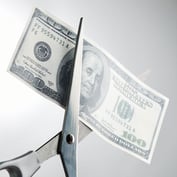Last week’s three-day stock market selloff, triggered mainly by a big rise in month-to-month inflation, failed to throw advisors who know the power of a robust financial plan.
“A well-thought-out plan that anticipates bad events is the armor that will protect you from your stomach taking over and your reacting, panicking and abandoning your strategy,” Larry Swedroe, chief research officer of Buckingham Strategic Wealth, tells ThinkAdvisor in an interview.
A member of the firm’s investment policy committee, he was previously vice chairman of Prudential Home Mortgage and senior vice president and regional treasurer of Citicorp.
At Buckingham for the last 25 years, his analyses of peer-reviewed academic research inform the RIA’s investment strategy recommendations.
In his interview with ThinkAdvisor, he points out that the coronavirus pandemic was clearly a black swan event, based on its timing, though he stresses that the expectation of calamities needs to be factored into financial plans.
It is “the advisor’s job,” he says, to educate clients that bad events will occur.
A prolific writer, Swedroe has authored eight books about investing, including “The Only Guide to a Winning Investment Strategy You’ll Ever Need,” and has co-written another eight works. His most recent is “Your Complete Guide to a Successful & Secure Retirement,” co-authored with Kevin Grogan (Harriman House, 2019).
ThinkAdvisor interviewed Swedroe on Thursday. Speaking by phone from St. Louis, where Buckingham is based, he urged advisors and investors not to plan for the worst event; instead, he said, “plan to survive the worst event.”
Here are the highlights of our interview:
THINKADVISOR: In view of the market selloff this week, should advisors talk with their clients about possible changes to retirement plans?
LARRY SWEDROE: You should be ignoring the noise in the market. The job and goal of the advisor is to get the plan right in the first place and anticipate that you don’t know what will happen — and neither does anybody else.
The advisor’s job is to educate the client that bad things will happen and say to them, “When they happen, I’m going to tell you to buy more to rebalance.” [Based on history], you have to assume we’ll get hit with a severe drop in the market once every eight years or so.
About how much does the market dip each year?
The typical year sees a drop of at least 10% or 15% at least once. Yesterday [May 12] was a couple of percentages — big deal. You don’t want to be reacting. You want to have a plan that anticipates that this could happen.
All you’re going to do is ignore the noise and rebalance your portfolio. A well-thought-out plan that anticipates bad events is the armor that will protect you from your stomach taking over and your reacting, panicking and abandoning your strategy.
What type of noise?
Ignore all forecasters and their outlook for the market. That has nothing to do with the client’s financial and life goals [that are factored into their plans]. The evidence is overwhelming that trying to adapt a plan based upon market forecasts is highly likely to prove counterproductive.
The job of the advisor is to get the client to act like the lowly postage stamp, which does one thing and one thing only exceedingly well: It sticks to the letter until it reaches its destination.
See: Harry Dent: ‘Biggest Crash Ever’ Likely by End of June
So, then, should advisors be rebalancing clients’ portfolios now?
If you’re not rebalancing, then you’re not sticking to your plan. Whenever individuals get cash — whether it’s their paycheck, or if it’s a bond that matures or an investment that pays dividends — instead of automatically investing it in the fund it came from, use it to buy what has underperformed.
Why is that?
That way, you don’t have to sell winners, and you minimize taxes. You don’t want to be rebalancing and incurring too much transaction cost and taxes.
What if the client objects to rebalancing on the grounds that they’ll have to pay more taxes?
Taxes should not be the driver. You want to invest tax-efficiently. That gets down to where you hold your assets. And rebalancing only should be done, generally, if you’re taking long-term capital gains, not short-term. You should wait till it’s long term and then immediately rebalance.
Suppose an investor has some new cash. Should they be buying today?
They should be buying today and any day they get money. Whenever you have cash, you should be a buyer. You should be thankful that the markets go down because you’re getting to buy more cheaply.
What’s the best way to be sure that you rebalance?
We set rebalancing [tolerance] bands to allow markets to drift a little before you act — unless you have new cash. New cash should always rebalance because you have to only buy. You don’t have to sell — and that saves transaction costs and taxes.
One good rule of thumb is [using] a 5% band at the major assets level, which is reasonable. So if you’re at 60% equities and 40% bonds, say, don’t rebalance until you get to at least 55% stocks.









 May 17, 2021 at 02:04 PM
May 17, 2021 at 02:04 PM











